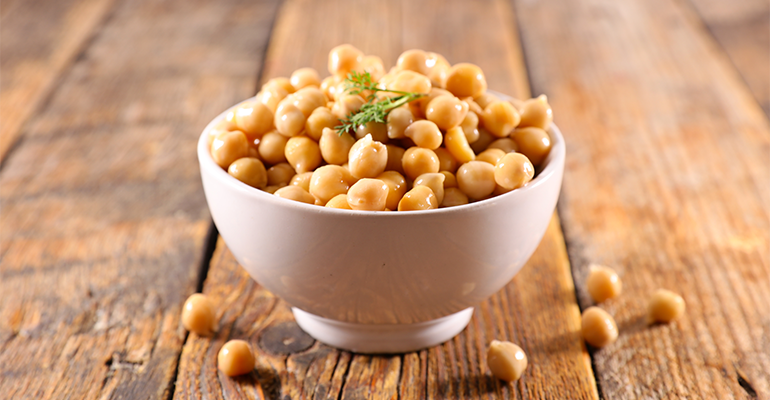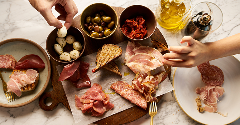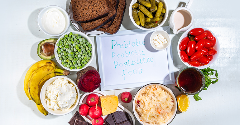News
Chickpea revolution? Companies looking to innovate could face higher prices as global shortage hits
5 Aug 2022
From coffee to ice cream, recent product launches demonstrate how companies are betting on chickpea in the plant-based revolution… but could a global shortage scupper innovation?
Some of the world’s most exciting food tech startups are betting on the protein-packed pulse as a source of innovative new products, but forecasts suggest global supplies of chickpeas could dip as much as 20% this year.

According to data from the Global Pulse Confederation, a combination of extreme weather and the war in Ukraine has caused damage to global supplies of chickpeas – leading to shortages and higher prices.
While chickpeas are well known for their inclusion in hummus and are commonly found in soups and stews, companies are taking interest in using the pulse in new and interesting ways due to its nutritional value and ease of use.
“Chickpea is interesting because of its nutrition potential. It is relatively high in protein, so can be used to boost the protein content of products – particularly plant-based products,” said Steve Osborn, director at The Aurora Ceres Partnership.
Meanwhile, Cindy Wong, vice president of sales at Franklin Farms – a US firm that recently launched a chickpea tofu – noted that chickpeas are a “nutrition-packed powerhouse”, rich in antioxidants and essential vitamins.
Osborn added that chickpeas are a well-recognised cupboard staple and, unlike soy, have the benefit of not being a declared allergen.
“In addition to the allergen-free status compared to soya, for example, the issue of sustainability is not going away. Pulses and legumes currently are seen as providing a much more positive, long-term sustainable profile,” he said.
The chickpea revolution
In addition to their nutritional profile and sustainable credentials, chickpeas also have a number of interesting functional properties that make them particularly interesting for food innovation, Osborn noted.
“Chickpea ingredients are known to have some positive functional benefits, such as good water and fat-binding properties,” he said. “As such, it can be utilised as a possible alternative to some modified starches and has the potential to be added to products to assist with improving the nutritional properties by helping to reduce the fat content.”
Furthermore, chickpeas can be popped and eaten like popcorn or ground into flour and used in a variety of protein-rich products. This combination of great nutritional profile and useful functional characteristics makes chickpea an “exciting” ingredient to formulate with, he said.
Barilla, the world's leading pasta producer, recently announced that a new pasta shape would be hitting shelves in the United States nationwide, including at Kroger, Meijer, Hyvee, Publix, and Amazon. Its Chickpea Penne is a single-ingredient pasta that the company says offers a protein-powered option on the classic pasta shape, and is free from any fillers, additives, or added gums.
The new chickpea pasta contains 19 grams of plant protein per serving and is certified gluten-free, vegan, and Non-GMO Project Verified.
Franklin Farms announced its chickpea tofu product, now available at Whole Foods stores nationwide. The firm’s Chickpea Tofu is made from chickpeas, offering consumers a soy-free meal solution that is low in fat and allergen free.
Meanwhile, a Canadian consortium including Humble and Frank Foods, InnovoPro, and The Star Group will develop chickpea ingredients and proteins to leverage the pulse’s full potential in food and strengthen its value chain in Canada – a leading grower and one of the largest exporters of chickpea.
“Chickpeas represent a new ingredient option for Canada’s growing plant-based food sector,” said Bill Greuel, CEO of Protein Industries Canada. “The consortium is creating significant benefits that will ripple across the value chain, from increasing capacity for Canadian farmers and processors, to expanding the healthy, high-protein food options for consumers around the world.”
How about a chickpea coffee… with chickpea milk?
Bhookha Haathi, one of India’s fastest-growing food tech startups and a preventive healthcare brand, recently launched a proprietary chickpea filter coffee in 22 Nature’s Basket stores across the country.
“Our Caffeine-free Chickpea Filter Coffee is a must-have for anyone who wishes to replace their regular caffeine intake with a healthier alternative. We believe Nature’s Basket is the right partner to help us reach out to our target consumer base,” said Abhimanyu Rishi, founder of Bhookha Haathi.
Sticking with coffee-based innovations, Israeli food tech startup ChickP has introduced a new protein isolate customised for “trendy”, dairy-alternative, barista-style coffee drinks. The company said it has developed an advanced prototype of a chickpea-based milk analogue that demonstrates the versatility of ChickP's pure protein, following its earlier use as an egg replacer for vegan mayonnaise.
ChickP said its IP-protected technology extracts pure protein while removing bitterness and many non-nutritional factors from chickpeas. The resulting ingredient has a neutral flavour, mitigating the need for sugar or flavour additives in the final product, and enabling beverage formulators to significantly shorten ingredients lists to deliver an all-natural product.
“Plant-based barista drinks set new challenges,” said Liat Lachish Levy, CEO of ChickP. “Consumers want a holistic, better-for-you, yet full flavour, experience.
“Our technologists took full advantage of our new state-of-the-art application lab to overcome organoleptic and technical challenges in creating creamy, dairy-free ‘milk’ for the perfect cappuccino.”
Barriers to innovation
While there is a clear desire for industry to innovate with chickpeas, the current market means innovation efforts could become more expensive and difficult to source, according to reports.
“Russia is exporting about 200,000 to 250,000 tonnes, minimum, a year. When the war started in February, the supply was destroyed, totally,” Jeff Van Pevenage, chief executive of Columbia Grain International, a grain and pulse merchandiser and supplier headquartered in Portland, Oregon, told Reuters.
Historically, both Russia and Ukraine have been some of the top exporters of chickpeas; however, the invasion has led to supply chain shortages. Russia was previously responsible for around a quarter of global chickpea trade, while the fact that farmers in the Ukraine have been unable to seed chickpea crop will result in an estimated deficit of 50,000 tonnes of chickpeas that otherwise would have ended up in the European market.
Meanwhile, in March, the Turkish Ministry of Trade issued a decree banning the transit trade of certain agricultural products, including lentils, chickpeas, wheat, dried beans, barley, sunflower seeds, and sunflower seed oil.
Other important regions for growing chickpea, including Australia and the USA, are also struggling, as farmers deal with weather and logistics issues.
Related news

Oat Barista: Innovation for game-changing beverages
20 Nov 2025
Oat Barista is a clean label, sustainable, and innovative drink base specifically designed to create the perfect foam in one single ingredient.
Read more
Nitrites: Pressure grows on UK to follow EU’s lead
20 Nov 2025
Pressure is growing on the UK to follow the EU’s lead after the bloc revised its regulations on the permitted levels of nitrites and nitrates in cured meats.
Read more
Empowering innovation in fortification and colouration
13 Nov 2025
Divi’s Nutraceuticals offers a large portfolio of innovative, high-quality ingredients for foods, beverages, and supplements, with bespoke solutions and expert support for product success.
Read more
Danone highlights digestive health as potential ‘tipping point’ for food industry
13 Nov 2025
Danone is betting on a food industry “tipping point” that will bloat the market for healthy products, particularly those related to gut health.
Read more
Standing Ovation and Bel scale up casein production from dairy co-products
11 Nov 2025
Foodtech company Standing Ovation has partnered with cheese specialist Bel Group to manufacture dairy serums for industrial-scale casein production via precision fermentation.
Read more
AI attraction means foodtech startups must ‘prove’ rather than ‘promise’
4 Nov 2025
Reports suggest that artificial intelligence (AI) is sucking investment from foodtech and agritech, but investors say the picture is complicated.
Read more
Will postbiotics become the go-to functional ingredient?
3 Nov 2025
Postbiotics show significant promise for the functional foods market due to their safety profile and beneficial bioactive properties, research suggests.
Read more
Meet the finalists of the Fi Europe Innovation Awards 2025
31 Oct 2025
Who made it to the shortlist of the Fi Europe Innovation Awards 2025? Read about the 23 companies making food and drink products healthier and manufacturing processes more efficient.
Read more
Penguin and Club bars no longer classed as chocolate
30 Oct 2025
Penguin and Club bars can no longer be classified as chocolate after the pladis-owned McVitie’s brands turned to cheaper alternatives amid the ongoing cocoa crisis.
Read more
Shorter drying time, sweeter success!
30 Oct 2025
Curious about cost-effective, sustainable and delicious candy making? Stefan Wessel reveals how Avebe’s solutions reduce drying time and energy use by up to 50%.
Read more